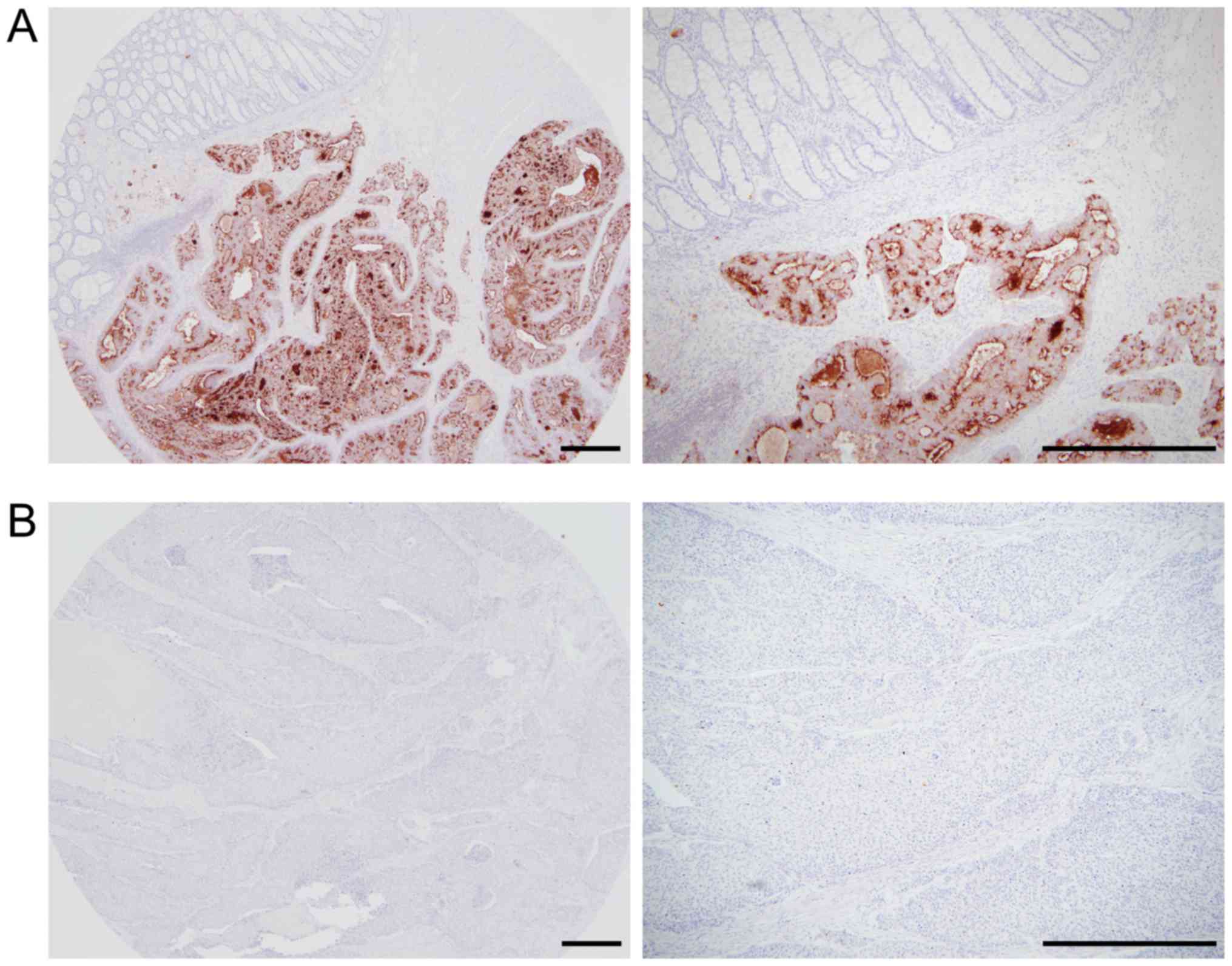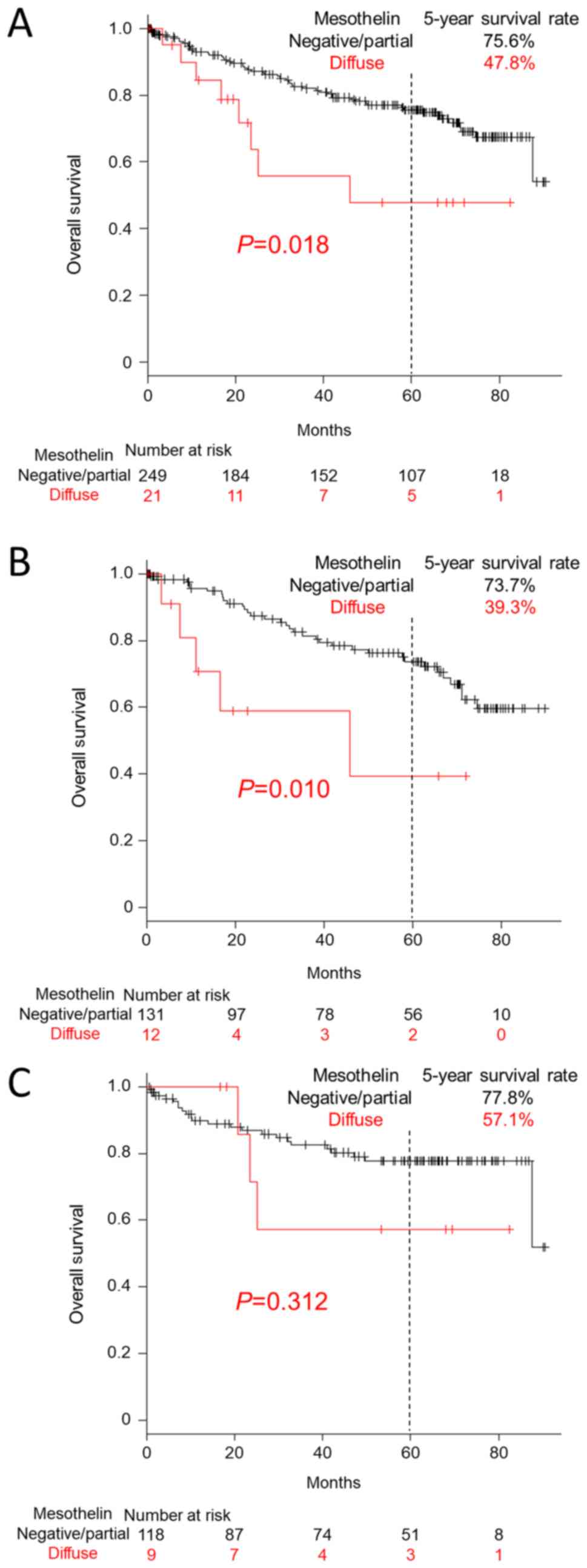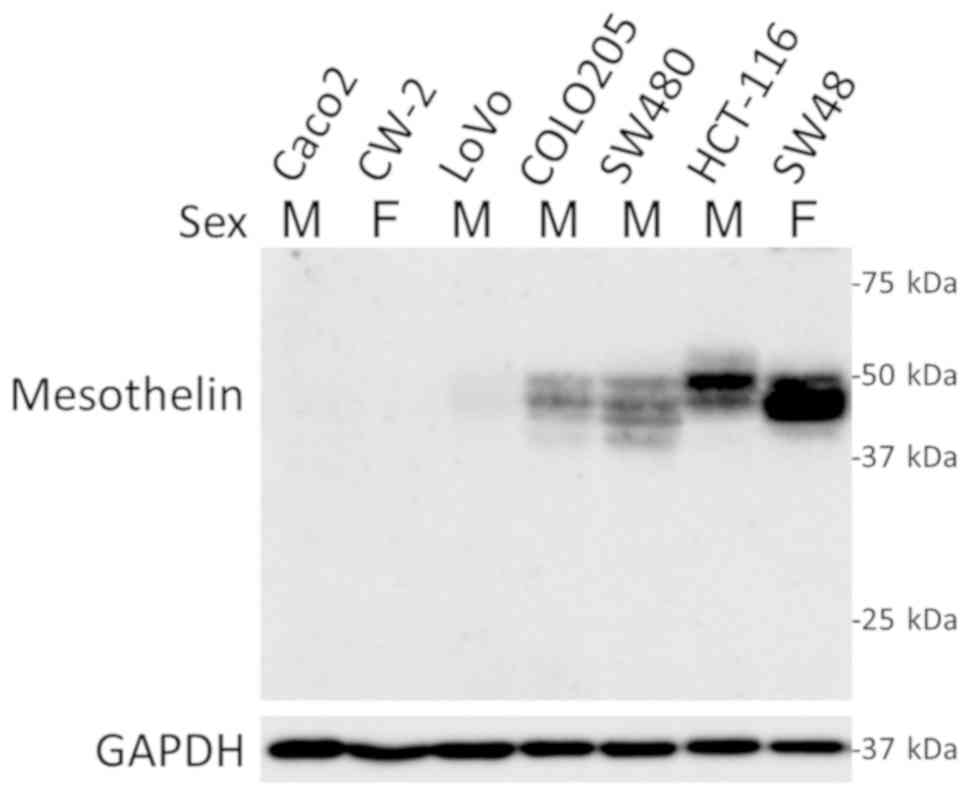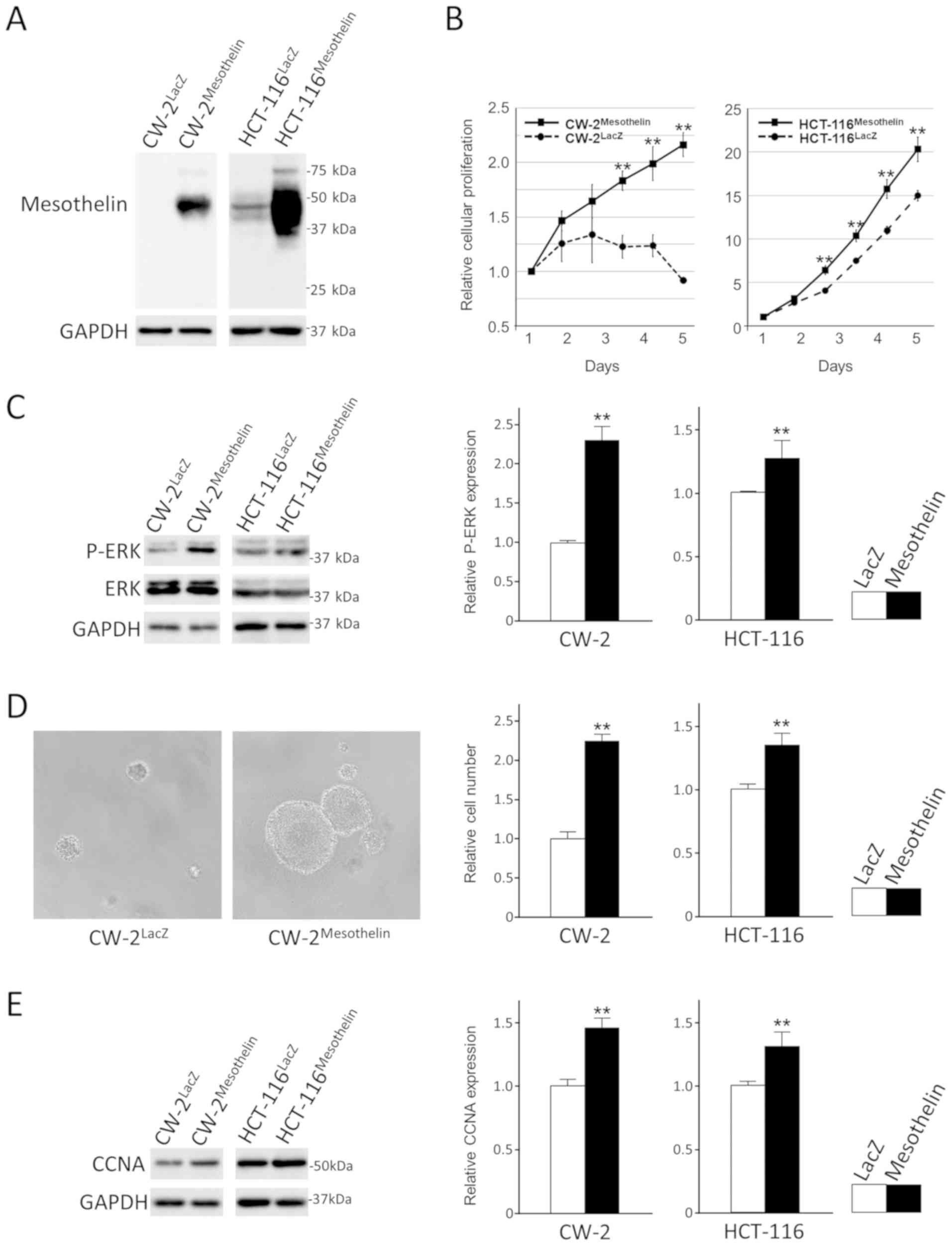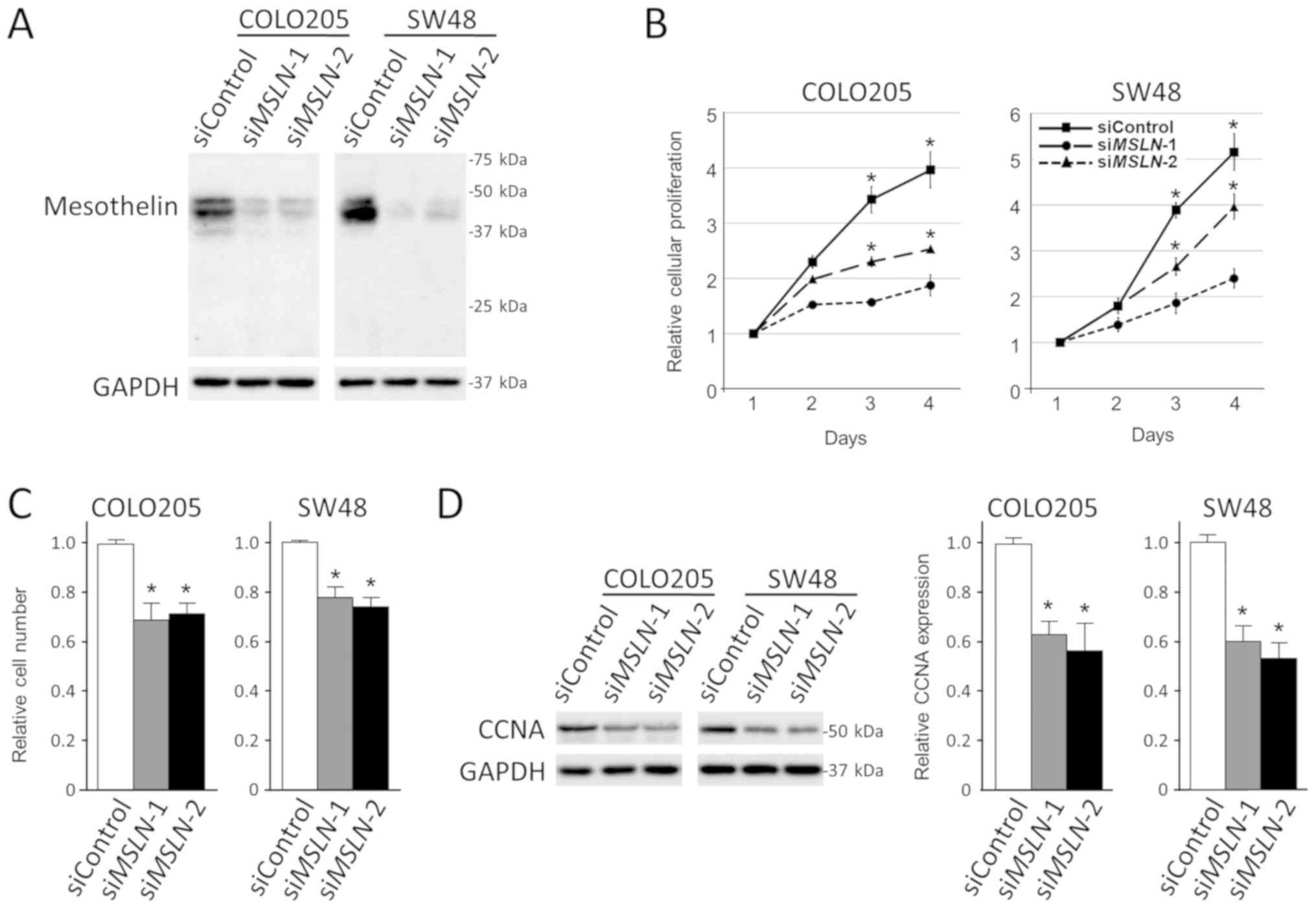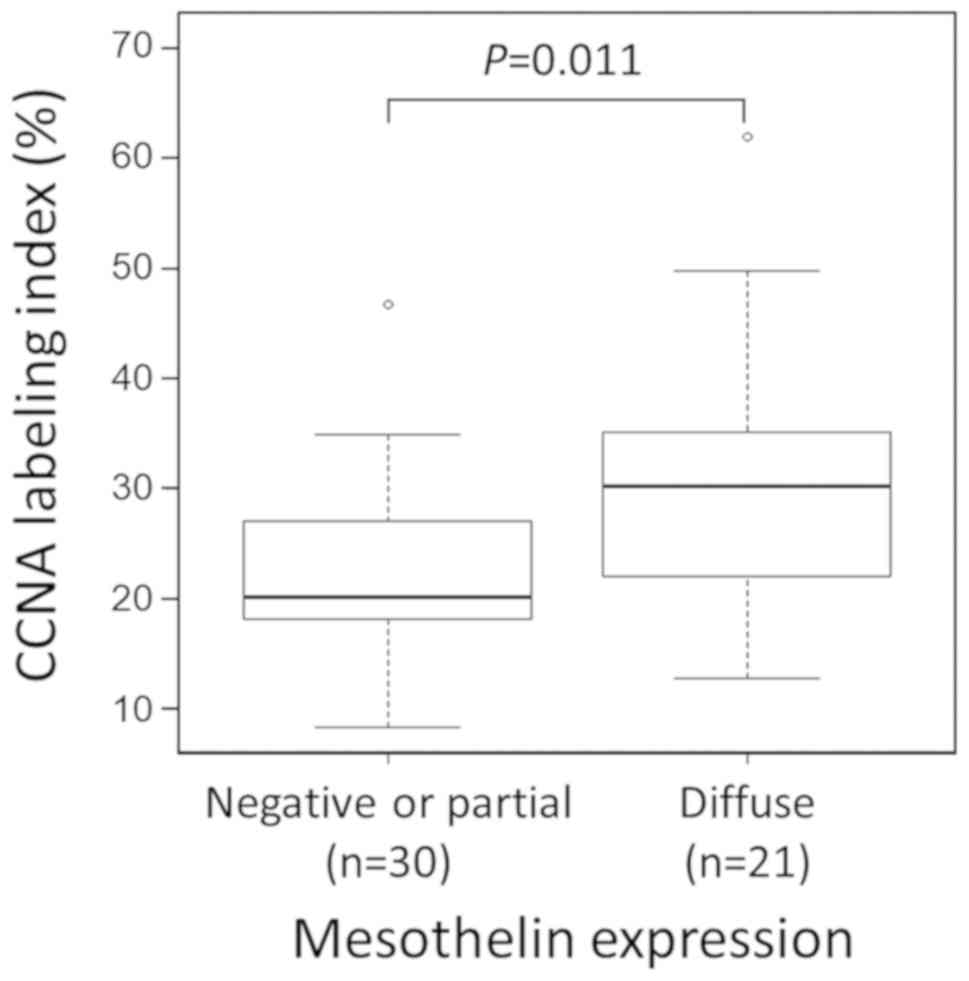|
1
|
Chang K and Pastan I: Molecular cloning of
mesothelin, a differentiation antigen present on mesothelium,
mesotheliomas, and ovarian cancers. Proc Natl Acad Sci USA.
93:136–140. 1996. View Article : Google Scholar : PubMed/NCBI
|
|
2
|
Bera TK and Pastan I: Mesothelin is not
required for normal mouse development or reproduction. Mol Cell
Biol. 20:2902–2906. 2000. View Article : Google Scholar : PubMed/NCBI
|
|
3
|
Chang K, Pai LH, Pass H, Pogrebniak HW,
Tsao MS, Pastan I and Willingham MC: Monoclonal antibody K1 reacts
with epithelial mesothelioma but not with lung adenocarcinoma. Am J
Surg Pathol. 16:259–268. 1992. View Article : Google Scholar : PubMed/NCBI
|
|
4
|
Hassan R, Kreitman RJ, Pastan I and
Willingham MC: Localization of mesothelin in epithelial ovarian
cancer. Appl Immunohistochem Mol Morphol. 13:243–247. 2005.
View Article : Google Scholar : PubMed/NCBI
|
|
5
|
Hassan R, Laszik ZG, Lerner M, Raffeld M,
Postier R and Brackett D: Mesothelin is overexpressed in
pancreaticobiliary adenocarcinomas but not in normal pancreas and
chronic pancreatitis. Am J Clin Pathol. 124:838–845. 2005.
View Article : Google Scholar : PubMed/NCBI
|
|
6
|
Miettinen M and Sarlomo-Rikala M:
Expression of calretinin, thrombomodulin, keratin 5, and mesothelin
in lung carcinomas of different types: An immunohistochemical
analysis of 596 tumors in comparison with epithelioid mesotheliomas
of the pleura. Am J Surg Pathol. 27:150–158. 2003. View Article : Google Scholar : PubMed/NCBI
|
|
7
|
Ordonez NG: Application of mesothelin
immunostaining in tumor diagnosis. Am J Surg Pathol. 27:1418–1428.
2003. View Article : Google Scholar : PubMed/NCBI
|
|
8
|
Kachala SS, Bograd AJ, Villena-Vargas J,
Suzuki K, Servais EL, Kadota K, Chou J, Sima CS, Vertes E, Rusch
VW, et al: Mesothelin overexpression is a marker of tumor
aggressiveness and is associated with reduced recurrence-free and
overall survival in early-stage lung adenocarcinoma. Clin Cancer
Res. 20:1020–1028. 2014. View Article : Google Scholar : PubMed/NCBI
|
|
9
|
Thomas A, Chen Y, Steinberg SM, Luo J,
Pack S, Raffeld M, Abdullaev Z, Alewine C, Rajan A, Giaccone G, et
al: High mesothelin expression in advanced lung adenocarcinoma is
associated with KRAS mutations and a poor prognosis. Oncotarget.
6:11694–11703. 2015. View Article : Google Scholar : PubMed/NCBI
|
|
10
|
Einama T, Homma S, Kamachi H, Kawamata F,
Takahashi K, Takahashi N, Taniguchi M, Kamiyama T, Furukawa H,
Matsuno Y, et al: Luminal membrane expression of mesothelin is a
prominent poor prognostic factor for gastric cancer. Br J Cancer.
107:137–142. 2012. View Article : Google Scholar : PubMed/NCBI
|
|
11
|
Inaguma S, Wang Z, Lasota J, Onda M,
Czapiewski P, Langfort R, Rys J, Szpor J, Waloszczyk P, Okoń K, et
al: Comprehensive immunohistochemical study of mesothelin (MSLN)
using different monoclonal antibodies 5B2 and MN-1 in 1562 tumors
with evaluation of its prognostic value in malignant pleural
mesothelioma. Oncotarget. 8:26744–26754. 2017. View Article : Google Scholar : PubMed/NCBI
|
|
12
|
Li YR, Xian RR, Ziober A, Conejo-Garcia J,
Perales-Puchalt A, June CH, Zhang PJ and Tchou J: Mesothelin
expression is associated with poor outcomes in breast cancer.
Breast Cancer Res Treat. 147:675–684. 2014. View Article : Google Scholar : PubMed/NCBI
|
|
13
|
Thomas A, Chen Y, Berman A, Schrump DS,
Giaccone G, Pastan I, Venzon DJ, Liewehr DJ, Steinberg SM,
Miettinen M, et al: Expression of mesothelin in thymic carcinoma
and its potential therapeutic significance. Lung Cancer.
101:104–110. 2016. View Article : Google Scholar : PubMed/NCBI
|
|
14
|
Yen MJ, Hsu CY, Mao TL, Wu TC, Roden R,
Wang TL and Shih IeM: Diffuse mesothelin expression correlates with
prolonged patient survival in ovarian serous carcinoma. Clin Cancer
Res. 12:827–831. 2006. View Article : Google Scholar : PubMed/NCBI
|
|
15
|
Kawamata F, Homma S, Kamachi H, Einama T,
Kato Y, Tsuda M, Tanaka S, Maeda M, Kajino K, Hino O, et al:
C-ERC/mesothelin provokes lymphatic invasion of colorectal
adenocarcinoma. J Gastroenterol. 49:81–92. 2014. View Article : Google Scholar : PubMed/NCBI
|
|
16
|
Shiraishi T, Shinto E, Mochizuki S, Tsuda
H, Kajiwara Y, Okamoto K, Einama T, Hase K and Ueno H: Mesothelin
expression has prognostic value in stage II/III colorectal cancer.
Virchows Arch. 474:297–307. 2019. View Article : Google Scholar : PubMed/NCBI
|
|
17
|
Kim H, Chung Y, Paik SS, Jang K and Shin
SJ: Mesothelin expression and its prognostic role according to
microsatellite instability status in colorectal adenocarcinoma.
Medicine (Baltimore). 98:e162072019. View Article : Google Scholar : PubMed/NCBI
|
|
18
|
Lv J and Li P: Mesothelin as a biomarker
for targeted therapy. Biomark Res. 7:182019. View Article : Google Scholar : PubMed/NCBI
|
|
19
|
Kanda Y: Investigation of the freely
available easy-to-use software ‘EZR’ for medical statistics. Bone
Marrow Transplant. 48:452–458. 2013. View Article : Google Scholar : PubMed/NCBI
|
|
20
|
Inaguma S, Lasota J, Felisiak-Golabek A,
Kowalik A, Wang Z, Zieba S, Kalisz J, Ikeda H and Miettinen M:
Histopathological and genotypic characterization of metastatic
colorectal carcinoma with PD-L1 (CD274)-expression: Possible roles
of tumour micro environmental factors for CD274 expression. J
Pathol Clin Res. 3:268–278. 2017. View
Article : Google Scholar : PubMed/NCBI
|
|
21
|
Inaguma S, Ito H, Riku M, Ikeda H and
Kasai K: Addiction of pancreatic cancer cells to zinc-finger
transcription factor ZIC2. Oncotarget. 6:28257–28268. 2015.
View Article : Google Scholar : PubMed/NCBI
|
|
22
|
Inaguma S, Kasai K and Ikeda H: GLI1
facilitates the migration and invasion of pancreatic cancer cells
through MUC5AC-mediated attenuation of E-cadherin. Oncogene.
30:714–723. 2011. View Article : Google Scholar : PubMed/NCBI
|
|
23
|
Inaguma S, Riku M, Hashimoto M, Murakami
H, Saga S, Ikeda H and Kasai K: GLI1 interferes with the DNA
mismatch repair system in pancreatic cancer through
BHLHE41-mediated suppression of MLH1. Cancer Res. 73:7313–7323.
2013. View Article : Google Scholar : PubMed/NCBI
|
|
24
|
Onda M, Willingham M, Nagata S, Bera TK,
Beers R, Ho M, Hassan R, Kreitman RJ and Pastan I: New monoclonal
antibodies to mesothelin useful for immunohistochemistry,
fluorescence-activated cell sorting, Western blotting, and ELISA.
Clin Cancer Res. 11:5840–5846. 2005. View Article : Google Scholar : PubMed/NCBI
|
|
25
|
Hmeljak J, Sanchez-Vega F, Hoadley KA,
Shih J, Stewart C, Heiman D, Tarpey P, Danilova L, Drill E, Gibb
EA, et al: Integrative molecular characterization of malignant
pleural mesothelioma. Cancer Discov. 8:1548–1565. 2018. View Article : Google Scholar : PubMed/NCBI
|
|
26
|
Bharadwaj U, Marin-Muller C, Li M, Chen C
and Yao Q: Mesothelin overexpression promotes autocrine IL-6/sIL-6R
trans-signaling to stimulate pancreatic cancer cell proliferation.
Carcinogenesis. 32:1013–1024. 2011. View Article : Google Scholar : PubMed/NCBI
|
|
27
|
Chang MC, Chen CA, Hsieh CY, Lee CN, Su
YN, Hu YH and Cheng WF: Mesothelin inhibits paclitaxel-induced
apoptosis through the PI3K pathway. Biochem J. 424:449–458. 2009.
View Article : Google Scholar : PubMed/NCBI
|
|
28
|
Servais EL, Colovos C, Rodriguez L, Bograd
AJ, Nitadori J, Sima C, Rusch VW, Sadelain M and Adusumilli PS:
Mesothelin overexpression promotes mesothelioma cell invasion and
MMP-9 secretion in an orthotopic mouse model and in epithelioid
pleural mesothelioma patients. Clin Cancer Res. 18:2478–2489. 2012.
View Article : Google Scholar : PubMed/NCBI
|
|
29
|
Masugi Y, Nishihara R, Hamada T, Song M,
da Silva A, Kosumi K, Gu M, Shi Y, Li W, Liu L, et al: Tumor
PDCD1LG2 (PD-L2) Expression and the lymphocytic reaction to
colorectal cancer. Cancer Immunol Res. 5:1046–1055. 2017.
View Article : Google Scholar : PubMed/NCBI
|















